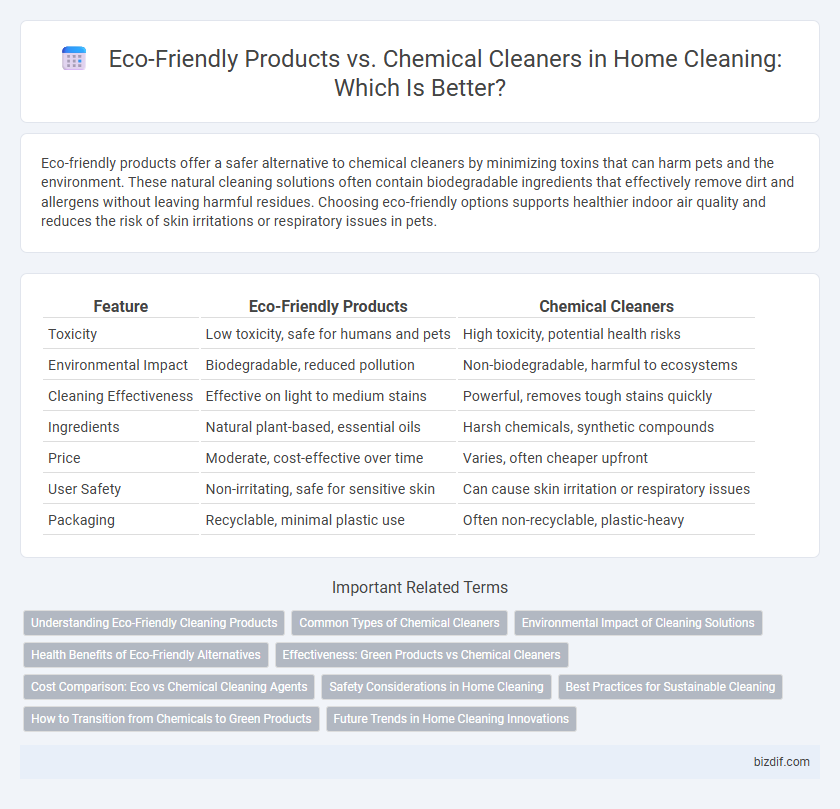Eco-friendly products offer a safer alternative to chemical cleaners by minimizing toxins that can harm pets and the environment. These natural cleaning solutions often contain biodegradable ingredients that effectively remove dirt and allergens without leaving harmful residues. Choosing eco-friendly options supports healthier indoor air quality and reduces the risk of skin irritations or respiratory issues in pets.
Table of Comparison
| Feature | Eco-Friendly Products | Chemical Cleaners |
|---|---|---|
| Toxicity | Low toxicity, safe for humans and pets | High toxicity, potential health risks |
| Environmental Impact | Biodegradable, reduced pollution | Non-biodegradable, harmful to ecosystems |
| Cleaning Effectiveness | Effective on light to medium stains | Powerful, removes tough stains quickly |
| Ingredients | Natural plant-based, essential oils | Harsh chemicals, synthetic compounds |
| Price | Moderate, cost-effective over time | Varies, often cheaper upfront |
| User Safety | Non-irritating, safe for sensitive skin | Can cause skin irritation or respiratory issues |
| Packaging | Recyclable, minimal plastic use | Often non-recyclable, plastic-heavy |
Understanding Eco-Friendly Cleaning Products
Eco-friendly cleaning products utilize natural ingredients such as plant-based surfactants, essential oils, and biodegradable agents that minimize environmental impact and reduce exposure to harmful chemicals. These products are free from toxic substances like ammonia, chlorine, and synthetic fragrances, ensuring safer use around children and pets while maintaining effective cleaning power. Choosing eco-friendly options supports sustainable living by decreasing water pollution and promoting healthier indoor air quality.
Common Types of Chemical Cleaners
Common types of chemical cleaners include bleach, ammonia, and multi-purpose detergents, which are known for their strong disinfecting and degreasing properties but often contain harsh substances that can harm health and the environment. These cleaners may release volatile organic compounds (VOCs) and toxic residues, contributing to indoor air pollution and water contamination. Choosing eco-friendly products with natural ingredients like vinegar, baking soda, and essential oils reduces environmental impact while maintaining effective cleaning performance.
Environmental Impact of Cleaning Solutions
Eco-friendly cleaning products significantly reduce environmental pollution by utilizing biodegradable ingredients that break down harmlessly in water systems. Chemical cleaners often contain toxic substances like ammonia and chlorine, which contribute to air and water contamination, harming aquatic life and ecosystems. Choosing sustainable cleaning solutions minimizes hazardous waste and lowers carbon footprints associated with manufacturing and disposal processes.
Health Benefits of Eco-Friendly Alternatives
Eco-friendly cleaning products reduce exposure to toxic chemicals found in traditional chemical cleaners, lowering risks of respiratory issues, skin irritation, and allergic reactions. Ingredients such as plant-based oils and natural enzymes promote safer indoor air quality and minimize environmental pollution. Using eco-friendly alternatives supports overall household health by eliminating harmful synthetic fragrances and harsh antibacterial agents commonly present in chemical cleaners.
Effectiveness: Green Products vs Chemical Cleaners
Eco-friendly products utilize natural ingredients that effectively eliminate dirt and bacteria while minimizing health risks and environmental impact compared to chemical cleaners. Chemical cleaners often provide more aggressive stain removal and quicker germ-killing action but can contain harmful substances linked to respiratory irritation and pollution. Studies show that many green products now match or surpass chemical cleaners in performance, especially for routine home cleaning tasks, making them a safer choice without sacrificing effectiveness.
Cost Comparison: Eco vs Chemical Cleaning Agents
Eco-friendly cleaning products typically have a higher upfront cost compared to traditional chemical cleaners, but their long-term savings arise from reusable packaging and concentrated formulas. Chemical cleaners often appear cheaper initially but may lead to higher expenses due to health risks, environmental damage, and frequent repurchases. Investing in sustainable cleaning agents reduces overall household costs by minimizing waste and promoting safer living environments.
Safety Considerations in Home Cleaning
Eco-friendly cleaning products significantly reduce exposure to harmful chemicals, making them safer for households with children, pets, and individuals with allergies or respiratory issues. Chemical cleaners often contain volatile organic compounds (VOCs) and toxins that can cause skin irritation, respiratory problems, and long-term health risks. Choosing biodegradable, non-toxic alternatives enhances indoor air quality and minimizes environmental impact while maintaining effective sanitation.
Best Practices for Sustainable Cleaning
Choosing eco-friendly products over chemical cleaners reduces indoor air pollution and minimizes environmental impact by avoiding harmful toxins. Sustainable cleaning best practices include using biodegradable ingredients, reusable cleaning tools like microfiber cloths, and concentrated formulas that reduce packaging waste. Incorporating vinegar, baking soda, and lemon as natural alternatives enhances effectiveness while preserving health and safety.
How to Transition from Chemicals to Green Products
Transitioning from chemical cleaners to eco-friendly products involves gradually replacing harmful substances with biodegradable and non-toxic alternatives, prioritizing ingredients like plant-based surfactants and essential oils. Start by reading labels carefully to avoid synthetic fragrances and harsh chemicals such as ammonia or bleach, opting for certifications like EPA Safer Choice or Green Seal. Incorporate DIY solutions using vinegar, baking soda, and lemon juice to maintain effective cleaning while reducing environmental impact and improving indoor air quality.
Future Trends in Home Cleaning Innovations
Future trends in home cleaning emphasize a shift towards eco-friendly products that minimize environmental impact while maintaining effective sanitation. Innovations include biodegradable ingredients, plant-based formulas, and smart dispensers that reduce waste and enhance efficiency. Chemical cleaners face increasing regulation, driving research into safer, sustainable alternatives compatible with modern lifestyles and health standards.
Eco-Friendly Products vs Chemical Cleaners Infographic

 bizdif.com
bizdif.com